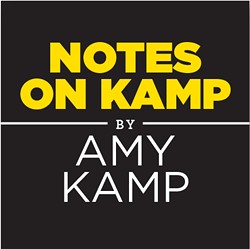Notes on Kamp: Our Transportation Crisis
How do you fix anything if you refuse to pay for it?
By Amy Kamp, Fri., May 20, 2016

Try walking north on Lamar, past the Rundberg intersection, and watch as the sidewalk abruptly ends. It's one of the more dramatic examples of a common problem Chronicle staff writer Richard Whittaker covered fairly comprehensively a couple of years back ("Where the Sidewalks End," July 11, 2014) – Austin's sidewalks are more gestures to the idea of walking than a real way of getting anywhere. It's possible to walk from one place to another outside of Downtown Austin, but only if you don't mind walking in the street, or on someone's lawn, or in a ditch whenever the sidewalk decides to give out on you.
The sidewalks are just one example of how if you're not firmly ensconced in the middle class or higher, this city can feel like it's just not for you. Don't get me wrong, Austin depends on having residents willing to work the low-paying jobs that allow a city to function. But survival can be a tenuous proposition. It's not easy to get around Austin with a car, but it's far worse without one. In his efforts to make 2016 the Year of Mobility, Mayor Steve Adler has repeatedly shown concern for how affordability and mobility intersect, and I admire his optimism in trying to tackle the issue head-on. But part of me worries that there's no fixing it.
The city's infrastructure simply is not what it needs to be to support the population it has, much less the one it'll have a year from now. Talking with the Chronicle for this week's feature, Council Member Sheri Gallo said, "We said, 'If we don't build it, they won't come,' and we were wrong." Austin has resisted time and again planning realistically for the future.
But, of course, the blame doesn't lie on Austin alone.
This week, Democrats at various levels of government have made a coordinated effort to argue that the state and federal funding needed to repair and rebuild our aging and out-of-date infrastructure is being held hostage by Republicans in Congress and state legislatures. Instead of providing that funding, says U.S. Rep. Eddie Bernice Johnson, they provide huge tax cuts to the rich, ignoring the fact that "infrastructure spending isn't some [kind] of game for Texans; it's a serious need ... Our prosperity can only grow when we have the infrastructure to support it."
A National League of Cities report released this week, "Paying for Local Infrastructure in a New Era of Federalism," states the burden this places on city governments succinctly and bleakly: "Declining funding, increasing mandates, and misaligned priorities at the federal and state levels have placed responsibility squarely on local governments to maintain roads, upgrade water and wastewater systems, and accommodate growing transit ridership. This represents a new federalism in which cities are taking the lead on issues historically driven by federal and state governments. Undermining this new dynamic, however, is insufficient funding authority at the local level. The ability of cities to meaningfully address growing infrastructure challenges is bound by levers authorized to them by states."
Cities wishing to fix their ailing infrastructure must use taxes that are at times regressive, including increased sales taxes and utility rates. Austin has few tools at hand to raise the funds needed to improve infrastructure, and it's no secret that the main tool, property tax, while not necessarily regressive, puts a lot of voters in a tough spot, especially when being forced to sell one's home due to rising property values is a real threat for many Austinites.
The U.S. Department of Transportation's Smart City grant could provide some relief to our city, and I would certainly be happy to see us get that $50 million, but the proposed uses for that money don't get to the heart of Austin's problem. Automated cars at the airport aren't going to solve the problems of people who need to be able to safely walk, bike, and take public transportation to get around.
So what then? While it's not yet clear what will be on the bond package for this year, it does seem fairly certain that there will be one. The last time we had a chance to vote for increased public transportation (in the form of the light rail), the city presented a plan that managed to alienate many who should have been natural supporters. But I'm not sure that a better plan would have overcome the "costs too much, does too little" crowd, either. We can't afford to make the same mistake this year, but that doesn't mean we won't do it anyway.
"Public Notice" will return next week. As always, send gossip, dirt, innuendo, rumors, and other useful grist to nbarbaro@austinchronicle.com.
Got something to say on the subject? Send a letter to the editor.









